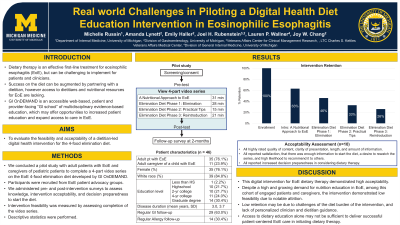Monday Poster Session
Category: Esophagus
P1837 - Real-World Challenges in Piloting a Digital Health Diet Education Intervention in Eosinophilic Esophagitis
Monday, October 23, 2023
10:30 AM - 4:15 PM PT
Location: Exhibit Hall

.jpg)
Joy W. Chang, MD, MS
University of Michigan
Ann Arbor, MI
Presenting Author(s)
Michelle Russin, MD, Amanda Lynett, MS, RDN, Emily Haller, RDN, MS, Joel H. Rubenstein, MD, MSCI, Lauren P. Wallner, PhD, MPH, Joy W. Chang, MD, MS
University of Michigan, Ann Arbor, MI
Introduction: Although effective for eosinophilic esophagitis (EoE), diet therapy can be challenging, and success can be augmented by dietitian guidance. However, access to dietitians is lacking and wide-reaching dietary resources are needed. We aimed to assess the feasibility and acceptability of a dietitian-led digital health intervention that provides structured education and nutritional support for the EoE elimination diet.
Methods: We conducted a pilot study with adult patients and caregivers of pediatric patients with EoE from patient advocacy groups to complete a 4-part video series on the EoE 4-food elimination diet developed by GI OnDEMAND. We administered pre- and post-intervention surveys to assess knowledge, intervention acceptability, and decision preparedness. Intervention feasibility was measured by assessing completion of the video series. Acceptability was measured by clarity and quality of the content, overall satisfaction, and intention for continued use. We then assessed the distribution of these measures descriptively.
Results: A total of 37 participants self-enrolled and completed the pre-intervention survey (Table 1). A 43% attrition rate was observed prior to starting the video series. Despite biweekly reminder emails, the final retention rate decreased with 22% completing the entire video series (Figure 1). At 4-months, acceptability data were available for 7 (19%) participants. All respondents were satisfied with the series, highly rated the quality of content, clarity of presentation, length and amount of information. All respondents felt that there was enough information to start the diet, would rewatch the series, and likely to recommend it to others. All reported that the series increased decision preparedness to start an elimination diet, think about pros and cons of diet versus other treatments, and prepared them to discuss their values with their doctor. Pre-intervention knowledge was high and remained unchanged.
Discussion: In a cross-sectional population of engaged patients and caregivers, this EoE diet therapy digital intervention demonstrated high acceptability, but low feasibility due to notable attrition during the video series. Reasons for low retention may include inherent difficulty of the diet, burden of the intervention, and need for personalized dietitian guidance and physician involvement. Strategies to improve adherence to therapy and further studies of digital health interventions and delivery in EoE are needed.

Disclosures:
Michelle Russin, MD, Amanda Lynett, MS, RDN, Emily Haller, RDN, MS, Joel H. Rubenstein, MD, MSCI, Lauren P. Wallner, PhD, MPH, Joy W. Chang, MD, MS. P1837 - Real-World Challenges in Piloting a Digital Health Diet Education Intervention in Eosinophilic Esophagitis, ACG 2023 Annual Scientific Meeting Abstracts. Vancouver, BC, Canada: American College of Gastroenterology.
University of Michigan, Ann Arbor, MI
Introduction: Although effective for eosinophilic esophagitis (EoE), diet therapy can be challenging, and success can be augmented by dietitian guidance. However, access to dietitians is lacking and wide-reaching dietary resources are needed. We aimed to assess the feasibility and acceptability of a dietitian-led digital health intervention that provides structured education and nutritional support for the EoE elimination diet.
Methods: We conducted a pilot study with adult patients and caregivers of pediatric patients with EoE from patient advocacy groups to complete a 4-part video series on the EoE 4-food elimination diet developed by GI OnDEMAND. We administered pre- and post-intervention surveys to assess knowledge, intervention acceptability, and decision preparedness. Intervention feasibility was measured by assessing completion of the video series. Acceptability was measured by clarity and quality of the content, overall satisfaction, and intention for continued use. We then assessed the distribution of these measures descriptively.
Results: A total of 37 participants self-enrolled and completed the pre-intervention survey (Table 1). A 43% attrition rate was observed prior to starting the video series. Despite biweekly reminder emails, the final retention rate decreased with 22% completing the entire video series (Figure 1). At 4-months, acceptability data were available for 7 (19%) participants. All respondents were satisfied with the series, highly rated the quality of content, clarity of presentation, length and amount of information. All respondents felt that there was enough information to start the diet, would rewatch the series, and likely to recommend it to others. All reported that the series increased decision preparedness to start an elimination diet, think about pros and cons of diet versus other treatments, and prepared them to discuss their values with their doctor. Pre-intervention knowledge was high and remained unchanged.
Discussion: In a cross-sectional population of engaged patients and caregivers, this EoE diet therapy digital intervention demonstrated high acceptability, but low feasibility due to notable attrition during the video series. Reasons for low retention may include inherent difficulty of the diet, burden of the intervention, and need for personalized dietitian guidance and physician involvement. Strategies to improve adherence to therapy and further studies of digital health interventions and delivery in EoE are needed.

Figure: Figure 1. Retention throughout the 4-part EoE video series
Disclosures:
Michelle Russin indicated no relevant financial relationships.
Amanda Lynett indicated no relevant financial relationships.
Emily Haller indicated no relevant financial relationships.
Joel Rubenstein indicated no relevant financial relationships.
Lauren Wallner: Gilead Sciences – Consultant.
Joy Chang: Sanofi-Regeneron – Consultant.
Michelle Russin, MD, Amanda Lynett, MS, RDN, Emily Haller, RDN, MS, Joel H. Rubenstein, MD, MSCI, Lauren P. Wallner, PhD, MPH, Joy W. Chang, MD, MS. P1837 - Real-World Challenges in Piloting a Digital Health Diet Education Intervention in Eosinophilic Esophagitis, ACG 2023 Annual Scientific Meeting Abstracts. Vancouver, BC, Canada: American College of Gastroenterology.
